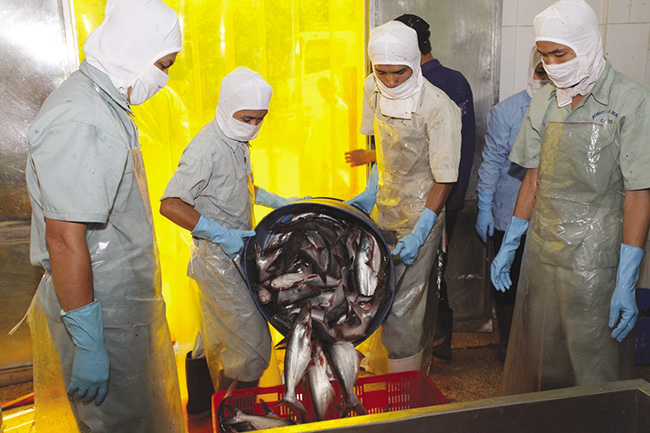Safe food is
fertile soil for financiers
There are
enormous opportunities for investment in agriculture in Vietnam, but through
mergers and acquisitions, success has only come to a few investors,
particularly the more experienced financiers.
The domestic
agricultural sector has recently witnessed scores of investors pursuing the
relatively new investment trend of organic food production. Many experts
forecast the rise of a wave of business startups engaged in organic
agricultural production and the application of technological advancements in agricultural
produce and seafood processing.
This
investment trend is being greeted by domestic and foreign investors and has
proven to be a life-buoy to Vietnamese agriculture, which is facing multiple
challenges arising from new-generation free trade agreements (FTAs) that
Vietnam has signed with other countries, such as the landmark Trans-Pacific
Partnership agreement (TPP).
South
Korea’s food conglomerate CJ Cheil Jedang recently announced its plan to pour
an additional $500 million into Vietnam, either directly or through a merger
and acquisition (M&A) path. The aim is turning Vietnam into its
second-largest offshore production base after China. The group currently
operates a farm, four processing plants, and one retail unit in Vietnam.
PAN Group is
a local business also relying on M&As to enter into the agricultural and
organic food production sector.
Nguyen Duy
Hung, chairman of Saigon Securities Incorporation – a leading financial
institution in Vietnam – and PAN Group shared that together they are
considering buying “bad assets” and currently less-effective businesses at
low prices, empowering them, then adding these companies to their enclosed
safe food chain model, which pursues the 3F (feed-farm-food) principle.
“We pay
attention to firms with long-term and sustainable development strategies. PAN
focuses on under-developed companies, buying them at below par value. We then
help them refit with much better growth indexes to become effective players
in their fields,” said Hung.
To date, PAN
Group has completed five M&A deals: with National Seed JSC (NSC), Long An
Food Processing Export JSC (LAF), Ben Tre Aquaproduct Import and Export JSC
(ABT), Bien Hoa Confectionery JSC (Bibica), and Southern Seed JSC (SSC).
A project
planting daisies is the group’s first step in flower and vegetable investment
through its subsidiary PAN-Salad Bowl, with capital contribution coming from
a Japanese partner. PAN Group held a dominant share in the joint venture
firm. In this field, PAN-Salad Bowl will engage in producing
high-quality products that are still badly needed in this market.
This month,
PAN Food, a member unit under PAN Group, bought a 20 per cent stake in 584
Nha Trang Seafood JSC, turning the latter into one of its affiliates. This
affiliate currently possesses 584 Nha Trang – a leading fish sauce brand.
The total
investment value PAN Group has put into these firms has surpassed VND1.93
trillion ($88.5 million). Most of the acquired companies have reported upbeat
business results in the post M&A period. For instance, LAF, one year
after its team-up with PAN Group, has escaped its loss-running status and has
begun to count its profits.
Meanwhile,
Vingroup, a leading property developer, will not miss out when it comes to
investment into organic agriculture. Vingroup’s three core targets with its
agricultural investment plans are the production of safe fruit and vegetables
to feed the market, promotion of hi-tech applications in large-scale fields
to save in production costs, and turning out agricultural produce with a high
export value.
Last year,
Vingroup spent VND2 trillion ($91.3 million) forming VinEco, specialising in
safe vegetable production for supply to locations across the country, such as
Quang Ninh, Thanh Hoa, and Dong Nai. The group retains a 70 per cent stake
valued at VND1.4 trillion ($63.9 million) in the new company.
In another
case, Thong Nhat Production and Investment JSC (GTN) have made strong forays
into the agricultural field by capitalising on the ongoing state-owned
enterprises equitisation wave.
GTN has
become a strategic partner of Vietnam Tea Corporation (Vinatea) holding a 75
per cent stake, and retaining a 12 per cent stake in Vietnam Livestock
Corporation (Vilico), as well as a 35.4 per cent stake in Saigon Forest
Products Import-Export JSC (Forimex).
According to
industry experts, any investor can avail of the agricultural sector potential
through M&As. However, when looking into M&A deals over the past few
years, it is apparent that there have been three main methods for effective
agricultural investment.
Firstly, we
have seen success with M&As. Secondly, through expansive investment with
the deployment of large-scale fields. For a group of businesses wishing to
develop a production chain, they need to form allied firms and develop stable
material sources.
In the third
option, firms need to have financial strength. Even with sound finance,
agricultural investment does not always bring success, as has been seen in
the case of leading steel maker, Hoa Phat Group. In their 20-year plus
development this group has ventured into many new fields, from the
manufacture of construction equipment to real estate investment, and even
electro-cryogenic products.
In the field
of agriculture and animal feed, Hoa Phat has faced growing competition from
multinationals on the Vietnamese market. Consequently, by the end of 2016’s
first quarter, when most of its businesses reported upbeat outcomes, the
agricultural investment generated nearly VND14 billion ($639,250) in losses.
By Anh Hoa, VIR
|
Thứ Hai, 27 tháng 6, 2016
Đăng ký:
Đăng Nhận xét (Atom)

Không có nhận xét nào:
Đăng nhận xét